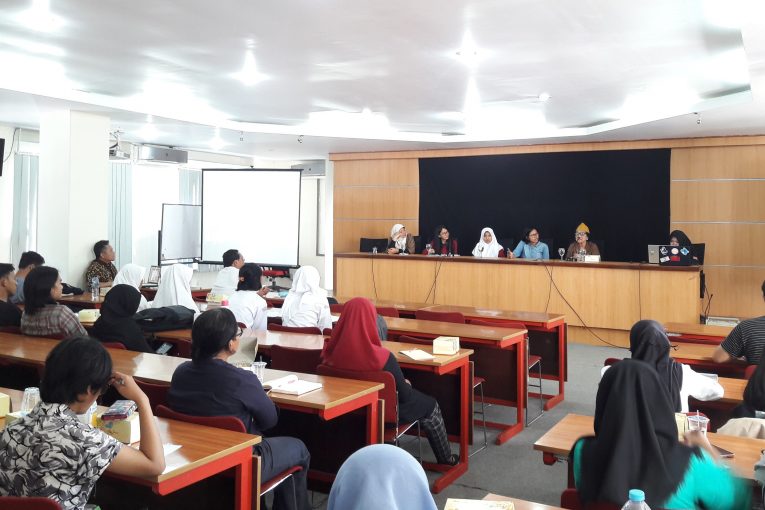
‘Memory between generations’ is a point to be discussed in the discussion which took place in the Multimedia Room, Margono Building, 2nd Floor, Faculty of Cultural Sciences UGM. More specifically, the discussion which lasted for 2 hours from 13:00 to 15:00 on Wednesday, August 21, 2019, discussed the memory of the role of women during the revolutionary period. This objective is in accordance with the title given, Dialogue of Three Generations of Women on the Indonesian Revolution. To achieve this goal, three speakers and one keynote speaker, all of whom were women, were invited to participate in this event, namely Mrs. Djuwariyah, Galuh Ambar Sasi, M.A., Shinta Dwi Nugraeni, and Dr. Mutiah Amini.
The first opportunity as a speaker was given to Mrs. Djuwariyah who shared her experience about the revolutionary period. As a witness to the history of the revolution that was born in 1933, when she was 15 years old, in 1948 to be precise, she became a member of the Red Cross who also served as a courier for the revolutionary soldiers in Yogyakarta. Now, at the age of 86 years, she is still able to tell in detail and coherently about the conditions she experienced during the revolution since the beginning she was involved in the struggle until the end of the struggle to defend the independence of the Republic of Indonesia. In addition, she was also involved in the Red Cross which served during the DI-TII period in Bumiayu. For Mrs. Dju, her nickname, the struggle during DI-TII was more difficult because the ‘enemies’ they faced were difficult to distinguish from other Indonesians. If Djuwariyah represented the early generation of the Indonesian revolutionary struggle, Galuh Ambar Sasi spoke as the second generation as an independent historical researcher. This alumni of the UGM History Masters program has an interest in women’s reactions to the proclamation and their role during the revolution. The third generation invited was Shinta Dwi Nugraeni, a student of Senior High School 2 Bantul. Shinta, who previously won first place in the 2019 National History Tour essay competition, shared her experience while studying history at school. For Shinta, the position of women during the revolutionary period was not significantly described, neither in textbooks nor in LKS books used in schools. No wonder, Shinta comments, that history is one of the most boring subjects for other students.
After the three speakers shared their experiences, Dr. Mutiah Amini, who was appointed as a keynote speaker who also has an interest in women’s history, gave responses and comments to the three speakers, especially about Djuwariyah’s experience during the revolution which will enrich the historical treasures of the revolution from a women’s perspective. Apart from that, she also spoke on a more general topic, namely the importance of women’s perspectives in history. For her, there are many historical periods that look minimal in archives but can actually be studied further. The use of symbolic sources when analyzed further will produce a very rich historical narrative.
By presenting speakers across generations, this discussion successfully taught how to interpret the role of women during the revolutionary period. [sej/habibi]
